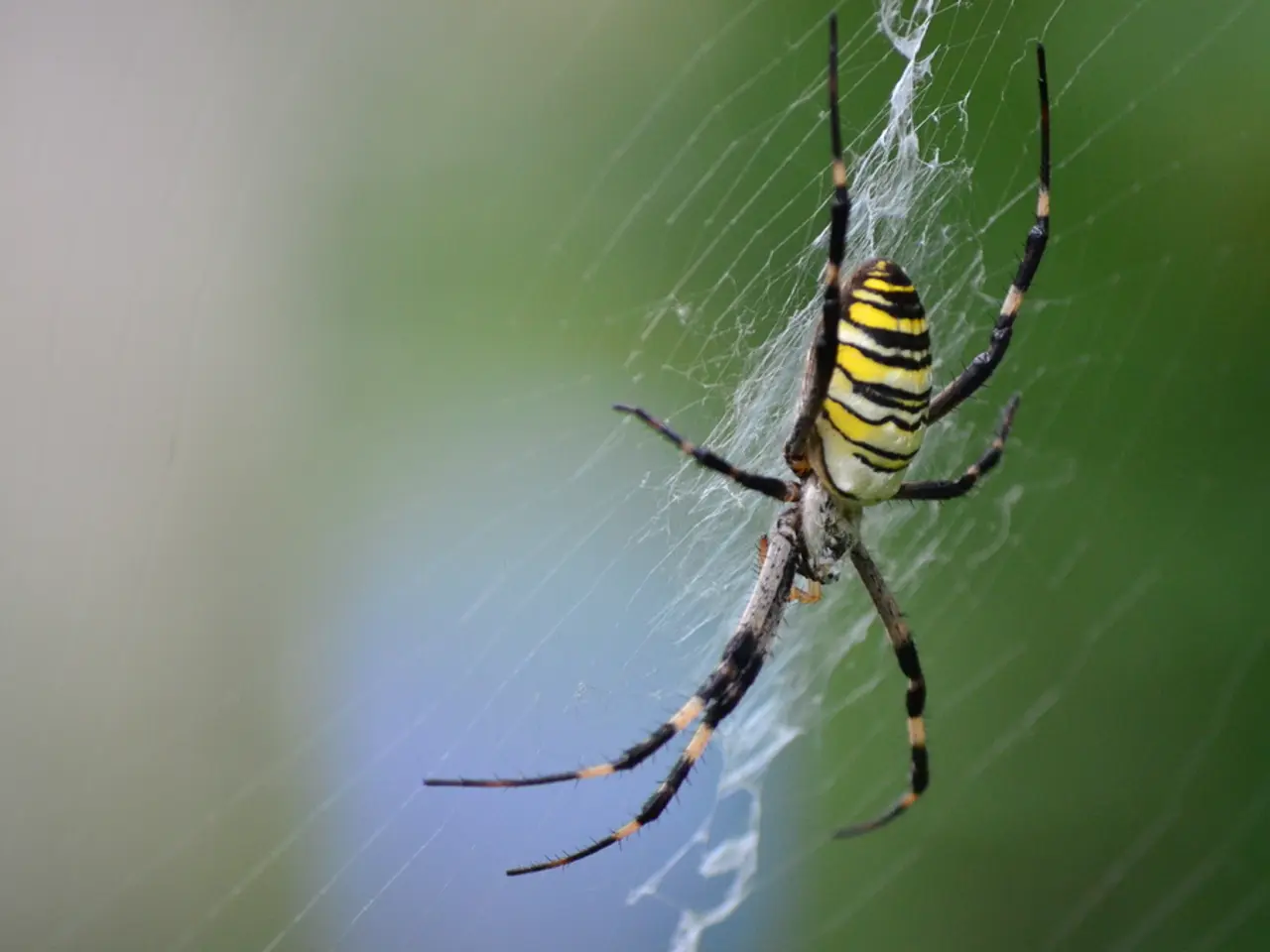Spiders from Africa's social species caught on camera, consuming their mothers from start to finish; historical first recording of the event.
The upcoming BBC Factual series, Parenthood, narrated by Sir David Attenborough, is set to premiere on Sunday, August 3 at 7.20 pm BST on BBC One. This captivating new series delves into the diverse parenting methods employed by various species to ensure their offspring's survival.
One fascinating adaptation showcased in Parenthood is the practice of matriphagy among African social spiders. Matriphagy, a form of parental cannibalism, occurs in the African social spider Stegodyphus dumicola. This peculiar behaviour sees the offspring consuming their mother, providing essential nutrition that boosts their weight and survival chances.
Matriphagy serves as an evolved reproductive strategy for African social spiders, where the mother's body acts as a meal, increasing the offspring’s growth and fitness. This behaviour minimises intra-sibling cannibalism, promoting colony cohesion, and enhances survival rates due to direct maternal resource transfer.
The mother's self-sacrifice through matriphagy is not a burden, as she willingly offers herself to her offspring. This behaviour is typical among some arachnids and insects, emphasising the evolutionary advantage of ensuring genes are successfully passed to the next generation.
It's worth noting that approximately 40 percent of female African social spiders do not reproduce. The "virgin females" in these groups are heavily involved in the parental care of their sisters' offspring.
The benefits of matriphagy for African social spider offspring include: - A nutritional boost that increases offspring weight and health - Minimization of intra-sibling cannibalism, promoting colony cohesion - Enhanced survival rates due to direct maternal resource transfer - Reinforcement of social living advantages in large colonies often exceeding 1,000 individuals
This behaviour represents a striking but adaptive form of parental care where death of the mother increases the overall reproductive success of her brood.
Parenthood promises to be an enlightening journey into the complex world of parenting, exploring various methods different species use to ensure their offspring's survival. All episodes of Parenthood will be available on BBC iPlayer. Don't miss the premiere on August 3!
[1] BBC Factual Series, Parenthood [2] Sir David Attenborough, Narrator, Parenthood [3] African Social Spider, Stegodyphus dumicola [4] Matriphagy, a form of parental cannibalism, in African Social Spiders [5] BBC iPlayer, streaming service for BBC content
- The upcoming BBC Factual series, Parenthood, showcases a range of parenting methods employed by various species.
- Sir David Attenborough narrates the captivating new series, Parenthood, premiering on BBC One.
- Parenthood explores the diversity in parenting techniques across different species.
- One unique adaptation presented in Parenthood is matriphagy among African social spiders.
- Matriphagy involves the consumption of the mother by offspring, providing essential nutrition in African social spiders.
- African social spider Stegodyphus dumicola practices matriphagy, which boosts offspring's weight and survival chances.
- Matriphagy serves as an evolved reproductive strategy in African social spiders.
- The mother's body in matriphagy acts as a meal, enhancing offspring's growth and fitness.
- Matriphagy helps minimize intra-sibling cannibalism and promotes colony cohesion.
- Direct maternal resource transfer in matriphagy enhances the survival rates of offspring.
- Matriphagy reinforces social living advantages in large colonies typically exceeding 1,000 individuals.
- Approximately 40 percent of female African social spiders do not reproduce; virgin females participate in parental care of sisters' offspring.
- Benefits of matriphagy for African social spider offspring include increased weight, less cannibalism, enhanced survival, and social cohesion.
- Matriphagy represents an adaptive form of parental care, with the mother's death contributing to the overall reproductive success of her brood.
- Parenthood delves into the complex world of parenting, offering insights into the diverse methods used for offspring survival.
- All episodes of Parenthood will be available on BBC iPlayer, so don't forget to catch the premiere on August 3!
- Sir David Attenborough not only narrates the BBC Factual series, Parenthood, but his presence continues to captivate audiences with his inspiring voice.
- Parenthood provides valuable lessons on evolution and adaptation, demonstrating the lengths parents go to secure their offspring's survival.
- Modern human families can take inspiration from the dedicated care displayed by various species in the Parenthood series.
- Other fascinating medical-conditions and chronic-diseases are discussed in health-and-wellness and mens- and womens-health literature.
- Consuming nutritious food, engaging in fitness-and-exercise, and maintaining a balanced lifestyle contribute to overall health and wellness.
- Mental-health issues affect countless individuals, necessitating therapies-and-treatments and responsible-gambling practices.
- Environmental-science research reveals a profound impact of climate-change on family-health and global-cuisines.
- Holistic lifestyle changes, including practicing mindfulness, incorporating CBD oil, and cooking healthy food, contribute to overall wellness.
- The connection between diet and aging is evident, as proper nutrition can help delay the effects of aging.
- Parenting resources, like books, can provide practical tips for managing motherhood, fatherhood, and child-raising practices.
- Social media platforms serve as a valuable tool for exchanging parenting tips, sharing recipes, and keeping up with entertainment (movies, TV, poker, roulette, casino-and-gambling news, casino-culture, pop-culture, sci-fi-and-fantasy, general-news, and crime-and-justice updates).







